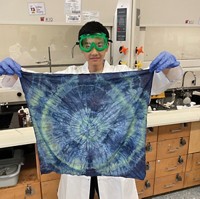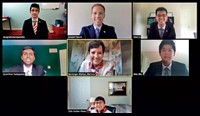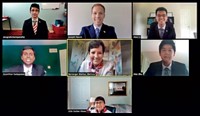Advertisement
Grab your lab coat. Let's get started
Welcome!
Welcome!
Create an account below to get 6 C&EN articles per month, receive newsletters and more - all free.
It seems this is your first time logging in online. Please enter the following information to continue.
As an ACS member you automatically get access to this site. All we need is few more details to create your reading experience.
Not you? Sign in with a different account.
Not you? Sign in with a different account.
ERROR 1
ERROR 1
ERROR 2
ERROR 2
ERROR 2
ERROR 2
ERROR 2
Password and Confirm password must match.
If you have an ACS member number, please enter it here so we can link this account to your membership. (optional)
ERROR 2
ACS values your privacy. By submitting your information, you are gaining access to C&EN and subscribing to our weekly newsletter. We use the information you provide to make your reading experience better, and we will never sell your data to third party members.
Education
Training Ground
Competition is fierce at the U.S. National Chemistry Olympiad study camp
by Linda Wang
November 17, 2008
| A version of this story appeared in
Volume 86, Issue 46

"I got product!" yelled Justin Koh, a senior from Bakersfield, Calif., as he eagerly scraped the bottom of his beaker with a microspatula, scooping out a yellowish clump of crystals.
At a lab bench across the room, Aditya Kalluri, a junior from North Olmsted, Ohio, stared at the slightly cloudy solution in his beaker, yearning for something to crystallize.
At the U.S. National Chemistry Olympiad study camp, every high score on an exam and every successful lab experiment inches a student closer to earning one of four coveted spots on the U.S. team that travels to the International Chemistry Olympiad.
The study camp is held every June at the Air Force Academy, in Colorado Springs, Colo., and is organized by the American Chemical Society. The 20 high school students who participated in this year's camp beat out some 10,000 students who took regional exams and roughly 900 students who took the national exam.
Once they arrived at the Air Force Academy, the students began a grueling schedule. They typically spent four hours a day in lecture classes, followed by four hours of lab work. They crammed virtually an entire undergraduate chemistry curriculum into two weeks, covering everything from organic chemistry to physical chemistry.
During a study break, the students rode a scenic cog railway up Pike's Peak, but many spent more time peering down at their textbooks than out the window. At mealtime, the students tried not to talk about chemistry, but inevitably succumbed because that's one interest they all share.
The intensity of the experience can wear on some of the students. "Almost everybody has a time during camp where they just think, 'Why am I here? I was the one where they made a mistake. I'm not supposed to be here,' " said peer mentor J. L. Kiappes, who participated in the study camp in 2004 and went on to win a silver medal at the international competition. "I feel like it's my job to remind them that they deserve to be here, they've earned it."
Back in the lab, Kalluri continued staring at the solution in his beaker, prodding it with a glass rod and turning it this way and that. His mentors told him not to worry and to continue with the rest of the experiment. Kalluri did but couldn't shake the feeling that his chances of making the U.S. team were becoming cloudier, too.
As it turned out, Koh was selected as an alternate. Kalluri didn't make the team—but there's always next year.
Cover Story
- Chemistry, Culture, and Camaraderie The international chemistry olympiad offers an experience worth its weight in gold
- Hooked On Teaching Mentors describe the U.S. National Chemistry Olympiad study camp as an 'adrenaline rush'





Join the conversation
Contact the reporter
Submit a Letter to the Editor for publication
Engage with us on Twitter